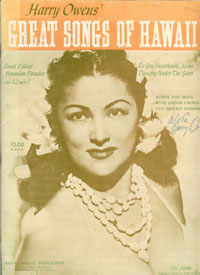Oscar Music
A discussion page of Oscar winning and nominated film music from the past
Oscar Music Disasters of 1937
By Roger Hall
Looking back 70 years ago, the Oscars for Best Song and Best Score were horrible choices.
For Best Song of 1937, the Oscar was awarded to: "Sweet Leilani" from WAIKIKI WEDDING.

How did this soupy Hawaiin-sounding song by Harry Owens win over the only song nominated by the great Gershwin brothers, George and Ira? Their song was "They Can't Take That Away From Me" from SHALL WE DANCE, a vastly underrated Fred Astaire and Ginger Rogers musical.
Yet the Academy voters did just that. The probable reason for the win was Bing Crosby, who was the star of WAIKIKI WEDDING and had a big hit recording of "Sweet Leilani" with Harry Owens and His Orchestra. Even that far back a hit song by a well known singer could sway Academy voters.
For many years after winning his Oscar, songwriter Harry Owens , a native of Nebraska, made his money by peddling songs of Hawaii (as the cover photo at left shows from 1964). Though his songs have a somewhat nostalgic charm to them, they fail to have the lasting quality of standards, as with George and Ira Gershwin.
Oscar Levant, a talented pianist and good friend of the Gershwins, made this caustic remark about the 1937 Oscar-winning song:
"Harry Owens music is dead, but he lives on forever!" (quoted in A Guide to Film Music)
That's a bit too harsh a statement. WAIKIKI WEDDING is actually an enjoyable musical film, though "Sweet Leilani" is only heard briefly in it, sung by Bing Crosby. Yet it should have never received the Oscar instead of the great Gershwin standard, "They Can't Take That Away From Me." It was a case of Bing Crosby winning over Fred Astaire on the popularity charts, since both singers had hits with their respective songs.
WAIKIKI WEDDING is now available in this DVD collection:
.jpg)
Bing Crosby - Screen Legend Collection
(5 movies on 3 DVDs)
For Best Score of 1937, the Oscar went to: 100 MEN AND A GIRL (No composer listed)
This was the biggest outrage of all, since the film consists of only famous classical music and little original music. With such worthwhile film scores as THE HURRICANE (Alfred Newman), THE LIFE OF EMILE ZOLA (Max Steiner), and LOST HORIZON (Dimitri Tiomkin), it is difficult to understand how the Oscar went to a film featuring classical music.
Maybe the Academy voters thought the sentimental film with Deanna Durbin and Leopold Stokowski was some sort of high art. 100 MEN AND A GIRL is a film story with mostly sentimenal slop. It is only redeemed by the classical music and the singing of Durbin. But that doesn't mean there is any worthwhile original film score to go with it. There just isn't any.
There are also later examples of bad choices made by Academy voters. They include ROUND MIDNIGHT (Herbie Hancock) for jazz, and THE FULL MONTY (Anne Dudley) for pop song arrangements.
Other than "Sweet Leilani," many of the Best Song Oscars went on to become standards, like "White Christmas" (1942), "Mona Lisa" (1950) and "Moon River" (1961).
Today we have mostly forgettable movie songs that don't last longer than a year or two in popularity.
Yet "Sweet Leilani" and 100 MEN AND A GIRL remain among the worst choices in Oscar music history.
Both deserve to be called Oscar Disasters.
Return to: Film Music Review
Read the choices for the
19th Annual Sammy Awards
18th Annual Sammy Awards
Sammy Awards (1988-2004)
Several songs with lyrics by Sammy Cahn are on the list of
100 Essential Songs
If you have comments or questions, write to:
